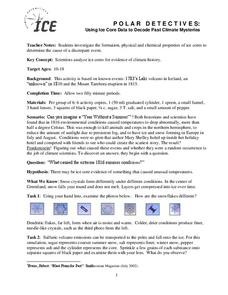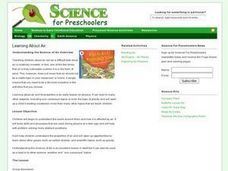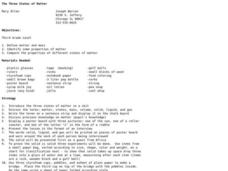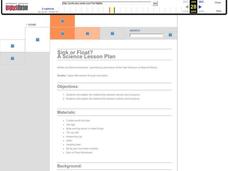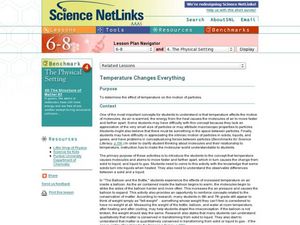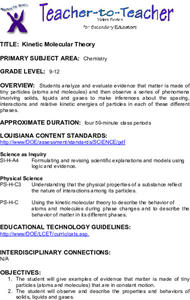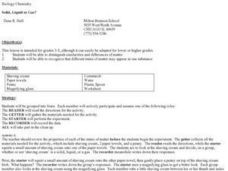University of Colorado
Patterns and Fingerprints
Human fingerprint patterns are the result of layers of skin growing at different paces, thus causing the layers to pull on each other forming ridges. Here, groups of learners see how patterns and fingerprints assist scientists in a...
Curated OER
2005 U.S. National Chemistry Olympiad - Local Section Exam
National Chemistry Olympiad tests are released after their use each year, since they cannot use them again for this event. The result: outstanding comprehensive assessment resources for general chemistry classes! This 2005 version covers...
Curated OER
Grossmont College - Chem 115 Practice Exam 2
Here is a straightforward practice test for first year chemistry learners. Responders balance equations, identify types of reactions, represent electron configurations, and solve stoichiometry problems. Keep this handy to use as...
Polar Trec
Polar Detectives: Using Ice Core Data to Decode Past Climate Mysteries
How does examining an ice core tell us about weather? Learners set up and explore fake ice cores made of sugar, salt, and ash to represent historical snowfall and volcanic eruptions. From their setups, scholars determine what caused the...
Curated OER
It's a Matter of Change
Learners watch a video on matter and identify examples of solids, liquids and gases in the classroom. They discuss the attributes for each kind of matter and conduct an experiment to explore how matter can change form.
Curated OER
Solid, Liquid, Gas!
Students determine the properties of the solids, liquids, and gases, and how they can recognize those properties by observing a teacher demonstration. Next, they experiment with at mystery matter that looks like a liquid but that takes...
Curated OER
What's the Matter?
First graders identify solids, liquids, and gases. In this matter lesson, the teacher guides students through numerous demonstrations as they determine the properties of solids, liquids, and gases and classify things as each. As the...
Curated OER
Learning about air
Learners read a book and have a class discussion about the air around them. In this air lesson plan, students learn about properties of air, and discuss other gases they have observed.
Curated OER
Teaching Matter with The Wild Christmas Reindeer
Second graders learn the proper way to take measurements, explore the properties of objects and expand their vocabulary.
Curated OER
The Three States of Matter
Third graders identify properties of solids, liquids, and gasses. In this states of matter lesson, the teacher demonstrates the properties of each state of matter, then students go on a scavenger hunt for items to represent each state...
Curated OER
Strange States of Matter
Fourth graders explore objects that do not fit into the categories given by three states of matter. They explore why an object doesn't fit perfectly into one of the three categories. Students observe the properties of Oobleck. They...
Alabama Learning Exchange
Air is All Around You
Pupils investigate the mysteries of air. In this science lesson, students participate in hands-on activities that require them to use the scientific inquiry model to study air.
Curated OER
Properties of Air
Students conduct investigations to demonstrate and learn that air takes up space, and puts pressure, or pushes, on everything around it. They conduct experiments to learn about feeling air pressure and measuring air pressure. Prior to...
Curated OER
Sink or Float?
Students analyze the relationship between density, buoyancy, and salinity. In this chemical properties lesson plan, students read a background activity for the lesson plan and experiments to the topics. Students discuss the questions and...
Curated OER
Air...What Gives?
Students investigate the properties of air by capturing it, squeezing it, and feeling its weight. In this forces lesson, students capture bags of air and examine its properties. The weight and pressure of air is emphasized.
Virginia Department of Education
Atomic Structure: Periodic Table
The fifth lesson of seven in the series outlines an in-depth analysis of the periodic table. After direct instruction, pupils take turns practicing in the group before beginning independent study. The assessments include a quiz and an...
Curated OER
Temperature Changes Everything
Middle school chemists visit interactive websites in order to discover what happens to molecular motion when heat is added to matter. They conduct an experiment that demonstrates the expansion of matter with the addition of heat. A lab...
Curated OER
Science: Liquid Matter
Second graders examine the properties of liquids and their classifications. They compare and contrast cups of different liquids and record their findings in journals. Students observe how liquids flow at various speeds and that unlike...
Curated OER
Do These Properties Matter?
Third graders rotate between three property stations, the solid station, the gas station, and the liquid station. They experiment with each activity until the teacher gives the signal to change.
Curated OER
Science: Water States
First graders investigate the various forms of water. They discuss the properties of water. They discover examples of water's various states and locate other solids, liquids, and gases in their homes.
Curated OER
Kinetic Molecular Theory
High schoolers analyze and evaluate evidence that matter is made of tiny particles. They observe a series of phenomena involving solids, liquids, and gases to make inferences about the spacing, interactions and relative kinetic energies...
Curated OER
Constancy and Change
Second graders identify three forms of matter- solids, liquids, and gases with 100% accuracy. They observe what happens when they try to put two kinds of matter into the same space and conclude that solids, liquids, and gases occupy space.
Curated OER
States of Matter
Learners discover states of matter. In this science lesson plan, students define matter, identify states of matter, explain properties of matter, and demonstrate the various uses of the states of matter.
Curated OER
Solid, Liquid, Or Gas?
Students identify physical characteristics and group objects for a picnic using the states of matter for each object and using literature to introduce the states of matter.





